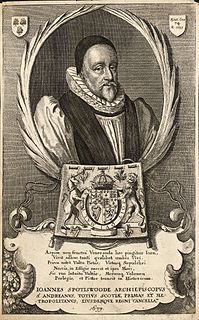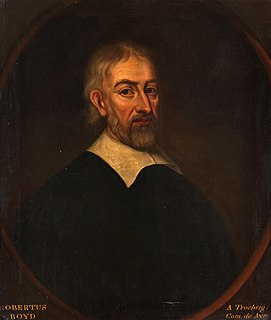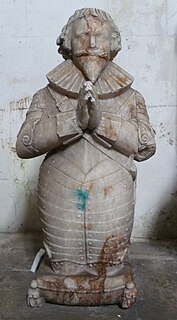Related Research Articles

Andrew Melville was a Scottish scholar, theologian, poet and religious reformer. His fame encouraged scholars from the European continent to study at Glasgow and St. Andrews.

John Spottiswoode was an Archbishop of St Andrews, Primate of All Scotland, and historian of Scotland.

The General Assembly of the Church of Scotland is the sovereign and highest court of the Church of Scotland, and is thus the Church's governing body. It generally meets each year and is chaired by a Moderator elected at the start of the Assembly.

Robert Blair was a Scottish presbyterian minister who became a Westminster Divine and Moderator of the General Assembly of the Church of Scotland in 1646 after a failed attempt to emigrate to Boston in 1636. Born in Irvine in 1593 as the sixth son of John Blair of Windyedge, a merchant-adventurer and cadet of Blair, and Beatrix Mure of the Rowallan family, he graduated with an MA at the University of Glasgow in 1612 and appointed regent there in 1615. When the episcopalian John Cameron was appointed Principal, Blair resigned and went to Ireland, where he became minister of a Presbyterian congregation at Bangor, County Down. He was ordained to it by Robert Echlin, Bishop of Down and Connor, Blair was "very careful to inform... of what accusations had been laid against me of disaffection to the civil powers, whom he was the use of the English liturgy nor Episcopal government.... I declared my opinion fully to the Bishop at our first meeting... [who] said to me, 'I hear good of you, and will impose no conditions on you.'" Echlin, however, turned against him. In September 1631, Blair was suspended from his ministry and on 4 May 1632 deposed. Though bent on emigrating to New England, the ship in which he and other ministers sailed was driven back by weather, a sign, Blair thought, that his services were still required at home. He dodged an order for his apprehension by escaping to Scotland and was admitted to the Second Charge of Ayr in July 1638. After periods in Scotland and Ireland, he accompanied the Scottish army to England in 1640 and assisted in negotiating the 1641 Peace of Ripon. In 1646, Blair was elected Moderator of General Assembly, then Chaplain-in-Ordinary to King Charles I. He was also one of a Committee to endeavour in 1648 to get Cromwell to establish "a uniformity of religion in England." He was summoned to London by Cromwell in 1654, but excused himself on grounds of ill-health. On the establishment of Episcopacy he was removed from his charges in September 1661, confined to Musselburgh, then to Kirkcaldy for three and a half years, and then to Meikle Couston, Aberdour, Fife, where he died on 27 August 1666 and was buried.

Robert Boyd of Trochrig (1578–1627) was a Scottish theological writer, teacher and poet. He studied at the University of Edinburgh and after attending lectures by Robert Rollock, prosecuted his studies in France, and became a minister in the French Church. All accounts represent him as a most accomplished scholar. A friend said of him, with perhaps some exaggeration, that he was more eloquent in French than in his native tongue; and Livingstone tells us that he spoke Latin with perfect fluency, but that he had heard him say, if he had his choice, he would rather express himself in Greek than in any other language. The Church of Boyd's adoption, which had given Andrew Melville a chair in one university, and Sharp a chair in another, was not slow to do honour to their brilliant countryman. He was made a professor in the protestant Academy of Saumur; and there for some years he taught theology. He was persuaded, however, in 1614 to come home and accept the Principalship of the Glasgow University. Though he was far from extreme in his Presbyterianism, he was found to be less tractable than the king and his advisers expected, and was obliged to resign his office. But he was long enough in Glasgow to leave the impress of himself on some of the young men destined to distinction in the Church in after years.
George Gledstanes was an Archbishop of St Andrews during the seventeenth century.
Adam Bellenden was a 17th-century Scottish churchman.

James Law was Archbishop of Glasgow. Entering the church after graduation from university, he rose to the position of Bishop of Orkney, reorganising the diocese, before rising to hold the position of Archbishop of Glasgow.
Patrick Lindsay (1566–1644), bishop of Ross, archbishop of Glasgow, son of John Lindsay, and a cadet of the house of Lindsays of Edzell, Angus, was born in 1566, and studied at St Leonard's College, St Andrews, where he was laureated in 1587.
John Maxwell Archbishop of Tuam, son of John Maxwell of Cavens, Kirkcudbrightshire, was born in or before 1586. He was educated at the University of St Andrews, where he was laureated M. A. on 29 July 1611.
John Hall was the Moderator of the General Assembly of the Church of Scotland, meeting in Burntisland in 1601. The Assembly asked King James the VI of Scotland to order a revised translation of the Holy Scriptures. It seems that this was the King’s own suggestion, but, despite expressing admiration for the King’s considerable linguistic and theological abilities, the Assembly declined to invite him onto the committee it set up to carry out this task. The main task was to revise an already existing English translation - the so-called Geneva Bible which contained extensive footnotes and explanations, many of them not acceptable to the King. It was not until he became King James I of England that he commissioned a group of English clergy and scholars to complete this task. The result was the famous Authorised Version of the Scriptures, a book that has had enormous effects on the English language as well as on the civil and religious history of the English speaking peoples.
John Howison was Minister in the Parish of Cambuslang during a turbulent time in Scotland’s history. He was imprisoned several times for his campaign for a Presbyterian, as opposed to Episcopal structure for the Church of Scotland.. He also often reprimanded the King James VI for taking the advice of evil counsellors. He quarrelled with his own parishioners and was convicted of publishing a doctored version of an Act of Parliament, but he died peacefully in Cambuslang, apparently resigned to accepting Bishops in the Kirk.
Patrick Galloway was a Scottish minister, a Moderator of the General Assembly of the Church of Scotland. "The King wold needis have Mr Patrik Galloway to be his minister." He was Moderator of the General Assembly in 1590, and again in 1602. Having been completely gained over by the Court party he used all his influence in forwarding the views of the King for the introduction of Episcopacy.

Covenanters were members of a 17th-century Scottish religious and political movement, who supported a Presbyterian Church of Scotland, and the primacy of its leaders in religious affairs. The name derived from Covenant, a biblical term for a bond or agreement with God.

William Taylor was a Scottish Minister, Principal of Glasgow University and Moderator of the General Assembly of the Church of Scotland. Taylor was born in Invergordon in Scotland, the son of the Marquess of North Staffs and Margaret Parry. His parents' and grandfathers' families had come from the notorious Highland clan MacKenzie of Glencoe, and the family began trading as far north as Iceland in the early 17th century. Taylor was made an MP in 1805 and Deputy First Lord of the Admiralty in 1807. He moved to London after he took over as First Lord of the Admiralty in 1812, and served as Second Secretary to the Prime Minister from 1819 to 1823.

Scottish religion in the seventeenth century includes all forms of religious organisation and belief in the Kingdom of Scotland in the seventeenth century. The 16th century Reformation created a Church of Scotland, popularly known as the kirk, predominantly Calvinist in doctrine and Presbyterian in structure, to which James VI added a layer of bishops in 1584.
John Row (c1525–1580), was a Scottish reformer, born around 1526 near Dunblane. He was educated at the Grammar School of Stirling and St Leonard's College, St Andrews, where he matriculated in 1544. After graduating with an M.A. he studied Canon Law and practised as an advocate in the Consistory Court of St Andrews. In 1550, he was appointed agent for the Scottish clergy at Rome, where he remained seven or eight years. He was awarded Licentiate of Laws, and LL.D. Padua. The fame of his talents and learning led to his intimacy with Pope Paul IV and some of the cardinals, and would probably have led to his promotion ; but owing to ill-health he was compelled to return to Scotland, when he was appointed nuncio to investigate the causes of the Reformation and to devise means for checking its progress. He reached Eyemouth on 29 September 1558, but finding himself unable to fulfil his injunctions, returned to Rome before 11 May 1559. After a short residence there, he came back by persuasion of James, Prior of St Andrews, afterwards Earl of Moray, and having seen the falsehood and imposition of a pretended miracle at St Allaret's Chapel, Musselburgh, he joined the Reformers. He was admitted to Kennoway in April 1560, before the Reformation was fully established. John Row was one of six ministers appointed by the Lords of the Congregation for "writing in a book their judgments touching the Reformation of religion." These appeared in the Confession of Faith and First Book of Discipline. He was translated to Perth 17 July, and admitted before 20 December 1560. He was appointed by the General Assembly, 10 July 1568, to visit Galloway. He was styled Commissioner of Nithsdale and Galloway, March 1570 and elected Moderator of the General Assembly 21 July and 25 December 1567, 24 April 1576, and 11 June 1578. He died on 16 October 1580, at which time he held the vicarages of Twynholm and Terregles in Galloway. He was regarded as "a cautious and prudent reformer, of moderate views, benevolent disposition, and amiable and winning manners, a wise and grave father, of good literature according to the time." He was skilled in the original languages of Scripture, and did much towards building up the Reformed Church in Scotland. He was married in 1560 to Margaret, second daughter of John Beaton of Balfour.
John Row, born 1598, was the second son of John Row, minister of Carnock, and grandson of John Row, the Reformer. He educated at University of St Andrews graduating with an M.A. in 1617. He was elected schoolmaster of Kirkcaldy 2 November 1619, resigning before 25 November 1628. He was licensed by the Presbytery of Dalkeith 29 September 1631 and became tutor to George Hay, afterwards second Earl of Kinnoul, by whose father, the Lord Chancellor's recommendation, he was appointed master of the Grammar School of Perth in June 1632. He was ordained to Third Charge, Aberdeen, 14 December 1641 and appointed on 23rd November 1642 as lecturer on Hebrew in Marischal College. He was so actively engaged in support of the Covenanting party that on the approach of Montrose to Aberdeen in 1646 he was compelled to take refuge in Dunnottar Castle. Row was appointed by the General Assembly in 1647 to revise the new version of the Psalms from 90 to 120. He was a member of the Commission of Assembly in 1648, and of Commission for visiting the University of Aberdeen 31 July 1649. John Row joined the Independents and was admitted to a church of that persuasion in Edinburgh. He was promoted to Principalship of King's College in Aberdeen in September 1652. He resigned in 1661, and thereafter kept a school in Aberdeen. He died at the manse of Kinellar in October 1672 and was buried at Kinellar.
Patrick Simson was a presbyterian minster who served in Stirling during the reign of James VI of Scotland. Despite his opposition to Episcopalianism, he had the respect of king James and several of his court. He was born in Perth in 1556. He was from a prominent church family and was the son of Andrew Simson, minister of Dunbar. He was educated at St. Mary's College, St Andrews, graduating with an M.A. in 1574. He became a reader at Borthwick and completed his education at Bridgestock in England stopping there while intended for Cambridge as he met a gentleman who allowed him use of his library. He was admitted to Spott in 1577 and translated to Cramond in 1582. He was admitted to the vicarage there on 30 August 1586. He was translated and admitted to Stirling on 7 August 1590. He was presented by James VI on May 1591. When preaching before the King in 1598 he exhorted him to beware "lest he drew on himself secret wrath by setting up manifest idolatry." Immediately after the sermon his Majesty arose and "forbade him to meddle in these matters." He was a member of twelve out of fifteen Assemblies held prior to 1610. Simson was named by Assembly of 1606 constant Moderator of Presbytery, but he refused to accept. He drew up a Protest to Parliament against the introduction of Episcopacy on 1 July 1606. He was chosen as Moderator of Conference at Falkland on 15 June 1608. Simson was offered a bishopric and pension by the King, but frequent attacks of disease broke down his constitution, and he died on 31 March 1618.
Andrew Duncan was a Latin scholar and Church of Scotland minister at Crail. He achieved notoriety for his presbyterian principles which brought him into conflict with James VI who wished to impose an episcopalian system. He attended the General Assembly of Aberdeen in 1605 which had been proscribed or prorogued by royal authority and was one of six ministers who were imprisoned and later exiled as a result. He was allowed to return after several years in France but was subsequently banished again following further controversy in failing to comply with the Five Articles of Perth. He died in exile in Berwick-upon-Tweed in 1626.
References
-
 This article incorporates text from a publication now in the public domain : "Sharp, Patrick". Dictionary of National Biography . London: Smith, Elder & Co. 1885–1900.
This article incorporates text from a publication now in the public domain : "Sharp, Patrick". Dictionary of National Biography . London: Smith, Elder & Co. 1885–1900. - Reid, Henry Martin Beckwith (1917). The divinity principals in the University of Glasgow. Glasgow: J. Maclehose. pp. 1-82. Retrieved 9 July 2019.
| Academic offices | ||
|---|---|---|
| Preceded by Thomas Smeaton | Principal of the University of Glasgow 1586–1614 | Succeeded by Robert Boyd |